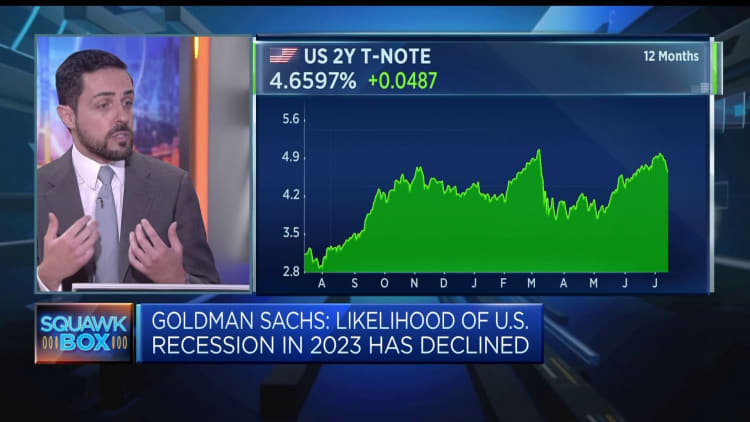Goldman Sachs cuts odds of a U.S. recession in the next year

Skyline of lower Manhattan and One World Trade Center in New York City and the Water’s Soul sculpture on July 11, 2023, in Jersey City, New Jersey. (Photo by Gary Hershorn/Getty Images)
Gary Hershorn | Corbis News | Getty Images
Goldman Sachs revised down the odds of a U.S. recession happening in the next 12 months, cutting the probability down to 20% from 25% on the back of positive economic activity.
The investment bank’s chief economist, Jan Hatzius, cited a slew of better-than-expected economic data in a research report released Monday.
“The main reason for our cut is that the recent data have reinforced our confidence that bringing inflation down to an acceptable level will not require a recession,” he said.
The chief economist cited resilient U.S. economic activity, saying second-quarter GDP growth was tracking at 2.3%. The rebound in consumer sentiment and unemployment levels falling to 3.6% in June also added to Goldman’s optimism.
The U.S. economy expanded 2% at an annualized pace in the first quarter. Last Thursday, data from the Labor Department showed that initial jobless claims fell to 239,000 for the week ended June 24, well below estimates of 264,000 and marking a 26,000 decline from the previous week.
There are also “strong fundamental reasons” to expect the easing of consumer price rises to continue after June’s core inflation, excluding food and energy, rose at the slowest pace since February 2021.
The investment bank, however, expects some deceleration in subsequent quarters as a result of sequentially slower real disposable personal income growth.
“But the easing in financial conditions, the rebound in the housing market, and the ongoing boom in factory building all suggest that the U.S. economy will continue to grow, albeit at a below-trend pace,” Hatzius said.
Goldman still expects a 25 basis point hike from the upcoming Federal Reserve meeting next week, but Hatzius believes that it could mark the last of the current cycle.
—CNBC’s Michael Bloom contributed to this report.
